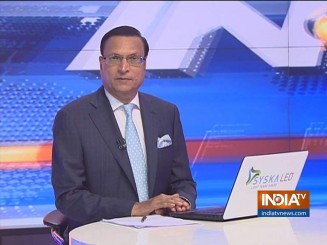 Prime Minister Narendra Modi’s historic speech after performing the Bhoomi Pujan at Ram Janmabhoomi in Ayodhya on August 5 emphasized the centrality of Lord Ram in Indian civilization, culture and its ethos.
Prime Minister Narendra Modi’s historic speech after performing the Bhoomi Pujan at Ram Janmabhoomi in Ayodhya on August 5 emphasized the centrality of Lord Ram in Indian civilization, culture and its ethos.
In a speech laced with quotes from Tulsi Das’ Ramcharitmanas, Guru Gobind Singh’s teachings and several other versions of Ramayana, Modi exhorted the people to follow the ‘maryada’ of Lord Ram and promote brotherhood among people of different religions, castes and communities. He also appealed to people not to hurt the sentiments of others and said that Lord Ram belonged not only to Hindus of India, but to many people from different religions.
Modi described how Ramayana was popular as an epic in the world’s most populous Islamic nation Indonesia, in another Islamic country Malaysia and in countries of South-East Asia like Cambodia, Laos and Thailand. He referred to the different versions of Ramayana written in all Indian languages, including the one written by Guru Gobind Singh, to explain how Lord Ram’s popularity cut across religions and regions. He also mentioned how Ram was also popular in the Muslim Sufi shrine Ajmer Sharif and in Muslim-dominated Lakshadweep. Modi said, “Ram belongs to all, Ram lives in all.”
The Prime Minister also compared the agitation for Ram Janmabhoomi temple with the struggle for India’s independence. He said, the Bhoomi Pujan event marked the end of a centuries-long wait for a Ram temple at his birthplace.
“For years, Lord Ram had to stay inside a tent, but now he has finally been liberated from the cycle of destruction and construction. During our freedom struggle, many generations sacrificed all that they had and there was no part of India which did not witness sacrifice for the sake of freedom. Similarly, August 5 symbolizes the commitment, sacrifice and resolve of several generations, who struggled relentlessly for centuries for building a Ram temple with single-minded resolve”, Modi said.
He said, “millions will find hard to believe that they are actually witnessing the realization of their dream (for a Ram temple)”.
Modi’s speech was not only illuminating, but it was also marked by a complete lack of rancour. There was not an iota of criticism about how the Ayodhya dispute was handled in the past, how Ram Bhakts were fired upon by police, and how governments were dismissed after the Babri mosque was demolished by mobs.
Modi’s speech only encompassed the life and teachings of Lord Ram, how Ram worked for the lowest strata of society during his times and gave them pride of place. He referred to non-upper caste figures like forest-dweller Shabari, the boatman who took him, Laxman and Sita across the river, the bird Jatayu and the Vaanar Sena. By this way, he obliquely rejected the theories propounded by certain intellectuals who say that Lord Ram was an icon only for Brahmins and other upper castes.
Millions watched Modi lying prostrate in front of Ram Lalla idol, the first Prime Minister to visit the shrine. After the Bhoomi Pujan was over, Modi took a pinch of soil from the sanctum sactorum and applied it on his forehead as a ‘tilak’. The nuances were clear. There was a sense of devotion, faith, peace and brotherhood among those assembled at the event. A leader known for his strong leadership had appeared before Lord Ram as a simple devotee.
One should understand why Modi spoke about the need for brotherhood, unity and lack of ill-will towards others.
Let me reveal. Few people know that Modi, in private life, is a religious person, both with his mind and his work. When he was a teenager, he left his home in Gujarat for the Himalayas in search of ‘nirvana’, stayed with sadhus at Belur Math, he did not run away from worldly life, nor did he turn away from the problems of day-to-day life. He stayed with the monks but learnt the lessons of how to eradicate social evils. He joined the Ram Janmabhoomi movement, but without any pomp and show. He preferred to stay in the background. He steeled his will in course of the agitation, vowing to build a Ram temple some day.
That day arrived, on August 5. This strong will of Modi has endeared him to the masses who believe, Modi delivers what he promises. In the wake of victory, Modi knows how to retain his balance. He avoided projecting the victory as a defeat for others, he offered to embrace all with ‘sabka saath, sabka vikas’. That is why, Modi took time on Wednesday to explain the virtues and qualities of Lord Ram. He explained the significance of what Lord Ram said about the duties of a ruler, about the discipline expected from the people.
By enunciating all these, Modi tried to convey the message that building of Ram temple should not be taken as a victory for Hindus and defeat for Muslims. That is why he took pains in projecting Lord Ram as a symbol, an icon of Indian civilization and its ethos. Lord Ram is the symbol of national unity, national strength and the nation’s prosperity.
Click Here to Watch Full Video | Get connected on Twitter, Instagram & Facebook